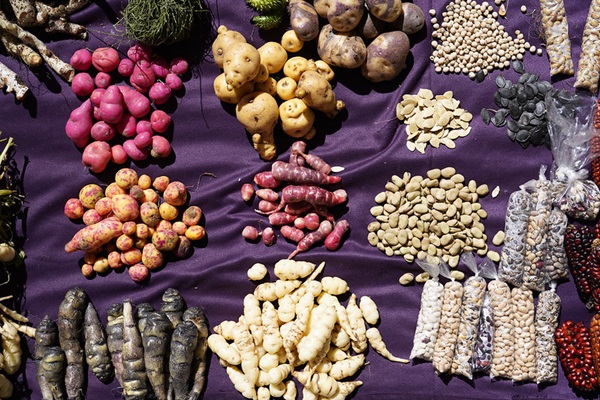
FAO's GIAHS Programme seeks new experts for the Scientific Advisory Group
26/02/2024
FAO is currently seeking applications from experts to join the Scientific Advisory Group (SAG) of its Globally Important Agricultural Heritage Systems (GIAHS) Programme for the 2024-2025 term. The Scientific Advisory Group, composed of nine members nominated by the FAO's Director-General, serves as a crucial expert body. Members are selected based on their individual merits rather than as representatives of member countries, with a focus on ensuring a balance in terms of region and gender.

Charting a transparent path for global forest data
25/02/2024
FAO has launched a new phase of work – supported with $2 million from the Global Environment Facility (GEF) – to assist developing countries in monitoring and reporting data on both the state and changes in their forest cover more effectively and transparently. The project will directly benefit at least 20 countries and more broadly support 236 countries and territories that are part of the FAO Global Forest Resources Assessment national correspondent network.

FAO supports Zimbabwe to stop the loss of agricultural biodiversity through sound management of pesticides
25/02/2024
Over the last three years, under the ACP-MEAS 3 project, a European Union-funded initiative that seeks to strengthen environmental governance and implement Multilateral Environmental Agreements (MEAs), Zimbabwe has made significant progress in policy development, sustainable agriculture research and development, mitigation of the impact of Highly Hazardous Pesticides (HHPs), and promotion of ecosystems-based agricultural practices through farmer field schools.

Putting the brakes on the loss of biodiversity for food and agriculture in Africa
06/02/2024
On 30 January, biodiversity experts from more than 20 African countries met in Harare to discuss the state of biodiversity for food and agriculture in the region and consider action to strengthen the conservation and sustainable use of biodiversity. National Focal Points shared experiences at national and regional levels with the aim of strengthening efforts to halt the loss of this key resource.

Call for experiences, best practices and scalable solutions for the integration of biodiversity into agriculture
04/03/2024
The agricultural sector - plant and animal production, fisheries, aquaculture, and forestry - depends on biodiversity and the ecosystem services it provides, but it is also the sector with the greatest influence on biodiversity. Through this call for submissions, stakeholders are invited to submit contributions on experiences and best practices, and concrete, scalable solutions concerning biodiversity and agriculture, in order to inform the International Symposium "Agriculture, Biodiversity and Food Security: From Commitments to Actions" – to be held in Quebec City, Canada, from April 30 to May 2, 2024 – and facilitate the development of recommendations.
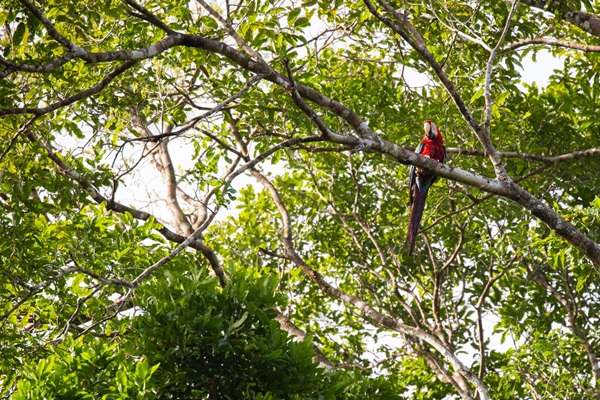
Sacred plant helps forge a climate-friendly future in Paraguay
15/02/2024
For generations, Ariel Benitez's ancestors, the Ava Guaraní people, one of the Indigenous Peoples living in eastern Paraguay, have been harvesting the green leaves of the yerba mate tree to make the bitter, caffeinated brew beloved in South America and beyond.

Pulses and soils: a dynamic duo
05/02/2024
They are the dried edible seeds of legumes both cultivated for food and feed. They are pulses, and if you didn’t know already, they have the potential to transform our agrifood systems.
Colourful and flavourful, small yet powerful, pulses include the well-known beans, lentils, chickpeas and peas but there are also the lesser-known kinds like tarwi beans and adzuki beans.

World Wetlands Day – 2 February
31/01/2024
The World Wetlands Day raises global awareness about the importance of wetlands for human prosperity and a healthy planet. FAO, in collaboration with the Ramsar Convention Secretariat and the Italian Ministry of Environment and Energy Security, will host the World Wetlands Day celebration on 2 February 2024 from 12:00 to 13:30 (CET) at FAO Headquarters and online.

Variety and genetic diversity of new trees key to successful forest and landscape restoration
22/01/2024
Ensuring the availability of seeds and seedlings from a range of tree species is crucial if we are to meet global targets on the restoration of degraded forests and landscapes, according to a new forestry working paper from the Food and Agriculture Organization of the United Nations and the Alliance of Bioversity International and CIAT.

FAO launches “ABC-Map” geospatial app to boost country capacity to confront climate change
22/01/2024
The Food and Agriculture Organization of the United Nations (FAO) in partnership with the International Fund for Agricultural Development (IFAD) has today launched an all-in-one tool to assess the environmental impact of projects and investments in the agriculture, forestry and land use (AFOLU) sector. The Adaptation, Biodiversity and Carbon Mapping Tool (ABC-Map) is an open-source satellite imagery app, based on Google Earth Engine, with information from global datasets including the World Database on Protected Areas (WDPA), land cover data sets from the European Space Agency and climate data from the ERA5 dataset.
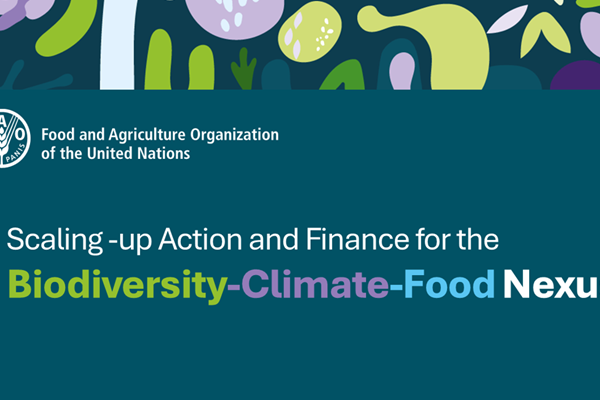
Regional webinars on scaling up action and finance for the Biodiversity–Climate–Food Nexus
22/01/2024
Virtual webinar for Latin America and the Caribbean
- 31 January 2024, 10:00-11:30 EST/ 16:00-17:30 CET - in English and Spanish
- Registration: https://f...

New global fisheries management body’s first meeting focuses on sustainable practices and promoting biodiversity
18/01/2024
A new global fisheries management body began its inaugural meeting this week with key items on the agenda including best practices and approaches for the effective management of fisheries resources, and improvements in the Food and Agriculture Organization of the United Nations (FAO) methodology to estimate the state and health of the world's marine fish stocks.

Charting the course for global restoration
02/01/2024
In a pivotal gathering from November 22nd to 24th, 2023, the Food and Agriculture Organization of the United Nations (FAO), the Secretariat of the Convention on Biological Diversity and the UN Environment Programme (UNEP) hosted a landmark event aimed at advancing the Kunming-Montreal Global Biodiversity Framework (GBF) Target 2 at FAO headquarters in Rome, Italy.

FAO Council welcomes Kunming-Montreal Global Biodiversity Framework
11/12/2023
The FAO Council, at its 174th Session, adopted Resolution 1/174 – The Kunming-Montreal Global Biodiversity Framework, as recommended by the Commission on Genetic Resources for Food and Agriculture at its 19th Regular Session.

International Mountain Day 2023
11/12/2023
Restoring mountain ecosystems is the theme of this year's International Mountain Day on 11 December. This theme was selected to fully include mountains in the UN Decade on Ecosystem Restoration 2021–2030, co-led by the Food and Agriculture Organization of the UN and the UN Environment Programme. The Decade is an opportunity to draw together political support, scientific research and financial resources to significantly scale-up restoration and prevent further degradation of mountain ecosystems.

International Mountain Day: Proof that restoring mountain ecosystems works
11/12/2023
On International Mountain Day (11 December), FAO celebrates the Central Asian Mountain Partnership (CAMP) Alatoo, a micro-reserve that was established to conserve local flora and fauna in Kyrgyzstan. Following consultations with local communities, the reserve protects 14 000 hectares of pastures and glaciers, with strict regulations on activities such as hunting and grazing.
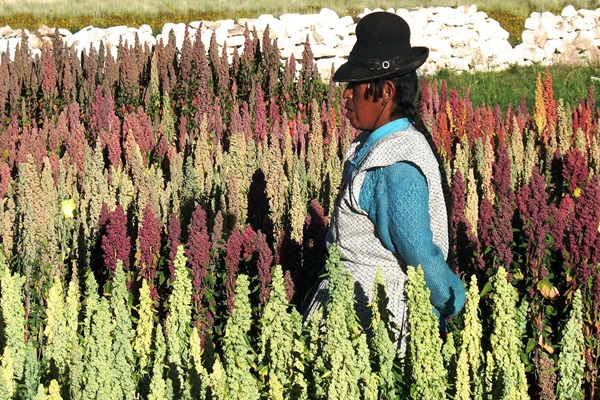
Upcoming International Workshop from 13 to15 December on GIAHS and Biodiversity
06/12/2023
This workshop seeks to foster information exchange, across regions, on the key factors affecting, and effective approaches for, conserving agrobiodiversity. The objectives are to identify and analyze effective approaches and measures which can assure a balance between agricultural production and agrobiodiversity conservation, highlighting the collaboration among all local stakeholders, and with the support of diverse activities and their synergetic effects; and to discuss the conditions, challenges and key factors for achieving the successful conservation of agrobiodiversity in GIAHS sites.
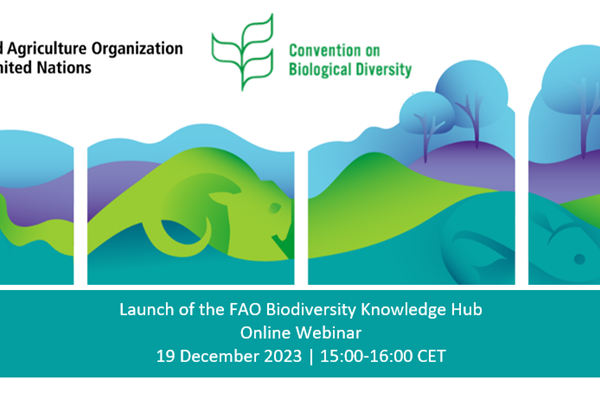
Upcoming webinar on 19 December: Launch of the FAO Biodiversity Knowledge Hub on the occasion of the First Anniversary of the adoption of the Kunming-Montreal Global Biodiversity Framework
06/12/2023
Time: 19 December 2023, 15:00-16:00 CET / 09:00-10:00 ET. Please register here.
The FAO Biodiversity Knowledge Hub will support users to access and use existing tools, guidance and other resources on biodiversity developed under FAO to mainstream biodiversity in agrifood sectors and assist policymakers and other actors to implement and monitor the GBF.

World Soil Day, 5 December | Soil and water, a source of life
04/12/2023
The World Soil Day 2023 and its campaign aim to raise awareness on the importance and relationship between soil and water in achieving sustainable and resilient agrifood systems. World Soil Day is a unique global platform that not only celebrates soils but also empowers and engages citizens around the world to improve soil health.

COP28: Agrifood Systems Transformation to Achieve Triple Wins – For People, for Climate and for Nature
04/12/2023
This side event at the COP28 Climate Change Conference in Dubai, organized by FAO, put a spotlight on the role of agrifood systems in mitigating climate change, protecting and conserving biodiversity, and building inclusive and resilient livelihoods.
